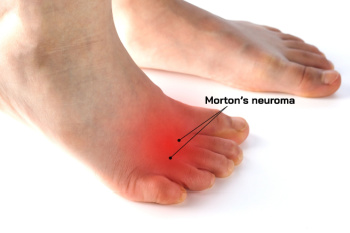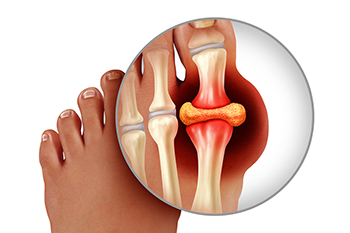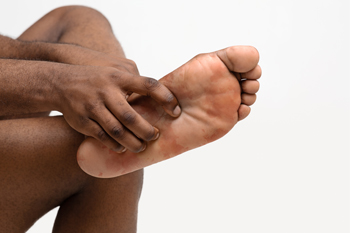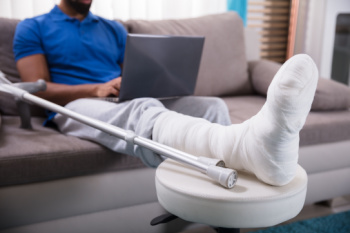

Morton’s neuroma is a painful condition affecting the nerves in the ball of the foot, typically between the third and fourth toes. This condition occurs when the tissue around the nerve thickens due to irritation or pressure, often from wearing tight or high-heeled shoes. Symptoms of Morton's neuroma include sharp pain, burning, or a sensation like stepping on a small stone. Numbness or tingling in the toes can also be experienced. Risk factors include wearing narrow footwear, having foot conditions like flat feet or bunions, or engaging in high-impact sports. A podiatrist can provide custom orthotics, lifestyle modifications, or non-invasive therapies to alleviate discomfort and prevent long-term damage. If left untreated, Morton’s neuroma can lead to chronic pain and permanent nerve damage, like numbness in the toes. If you have pain in the ball of the foot that may be from Morton’s neuroma, it is suggested that you make an appointment with a podiatrist for an exam, diagnosis, and treatment options.
Morton’s neuroma is a very uncomfortable condition to live with. If you think you have Morton’s neuroma, contact Dr. Harris L. Klear of Burlington County Podiatry Associates. Our doctor will attend to all of your foot care needs and answer any of your related questions.
Morton’s Neuroma
Morton's neuroma is a painful foot condition that commonly affects the areas between the second and third or third and fourth toe, although other areas of the foot are also susceptible. Morton’s neuroma is caused by an inflamed nerve in the foot that is being squeezed and aggravated by surrounding bones.
What Increases the Chances of Having Morton’s Neuroma?
Morton’s neuroma is a very treatable condition. Orthotics and shoe inserts can often be used to alleviate the pain on the forefront of the feet. In more severe cases, corticosteroids can also be prescribed. In order to figure out the best treatment for your neuroma, it’s recommended to seek the care of a podiatrist who can diagnose your condition and provide different treatment options.
If you have any questions, please feel free to contact one of our offices located in Marlton and Delran, NJ . We offer the newest diagnostic and treatment technologies for all your foot care needs.

Gout is a type of arthritis caused by the accumulation of uric acid crystals in the joints, leading to sudden, severe pain and inflammation. It commonly affects the big toe but can impact other joints as well. Early symptoms of gout include intense pain, swelling, redness, and warmth in the affected joint, often starting abruptly at night. If left untreated, gout can lead to chronic joint damage, kidney stones, and decreased mobility. Certain factors increase the risk of developing gout, such as a high-purine diet, obesity, and genetic predisposition. Diagnosis typically involves a combination of medical history, physical examination, and laboratory tests to measure uric acid levels and confirm crystal presence through joint fluid analysis or imaging. Managing gout effectively can require medication and lifestyle changes. If you experience persistent big toe pain from gout, it is suggested you schedule an appointment with a podiatrist for a thorough diagnosis and personalized treatment plan.
Gout is a foot condition that requires certain treatment and care. If you are seeking treatment, contact Dr. Harris L. Klear from Burlington County Podiatry Associates. Our doctor will treat your foot and ankle needs.
What Is Gout?
Gout is a type of arthritis caused by a buildup of uric acid in the bloodstream. It often develops in the foot, especially the big toe area, although it can manifest in other parts of the body as well. Gout can make walking and standing very painful and is especially common in diabetics and the obese.
People typically get gout because of a poor diet. Genetic predisposition is also a factor. The children of parents who have had gout frequently have a chance of developing it themselves.
Gout can easily be identified by redness and inflammation of the big toe and the surrounding areas of the foot. Other symptoms include extreme fatigue, joint pain, and running high fevers. Sometimes corticosteroid drugs can be prescribed to treat gout, but the best way to combat this disease is to get more exercise and eat a better diet.
If you have any questions please feel free to contact one of our offices located in Marlton and Delran, NJ . We offer the newest diagnostic and treatment technologies for all your foot and ankle needs.

Pain in the ball of the foot, known as metatarsalgia, can result from various factors. One common cause is excessive pressure from wearing ill-fitting shoes, which compress the forefoot and lead to discomfort. High-impact activities and sports can also contribute to pain by putting repetitive stress on the metatarsal bones. Additionally, conditions such as bunions or Morton’s neuroma can cause localized pain and swelling. Inflammatory conditions like arthritis and tendinitis can increase discomfort in the ball of the foot. Additionally, flat feet or high arches can alter foot mechanics, adding pressure on the metatarsals. Managing this pain involves choosing supportive footwear, adjusting activity levels, and seeking medical advice from a podiatrist to address underlying conditions. If you have pain in this part of your foot, it is suggested that you visit a podiatrist who can accurately diagnose what is going on and provide treatment.
Foot Pain
Foot pain can be extremely painful and debilitating. If you have a foot pain, consult with Dr. Harris L. Klear from Burlington County Podiatry Associates. Our doctor will assess your condition and provide you with quality foot and ankle treatment.
Causes
Foot pain is a very broad condition that could be caused by one or more ailments. The most common include:
Diagnosis
To figure out the cause of foot pain, podiatrists utilize several different methods. This can range from simple visual inspections and sensation tests to X-rays and MRI scans. Prior medical history, family medical history, and any recent physical traumatic events will all be taken into consideration for a proper diagnosis.
Treatment
Treatment depends upon the cause of the foot pain. Whether it is resting, staying off the foot, or having surgery; podiatrists have a number of treatment options available for foot pain.
If you have any questions, please feel free to contact one of our offices located in Marlton and Delran, NJ . We offer the newest diagnostic and treatment technologies for all your foot care needs.

When dealing with a broken foot, it is important to rest and protect the injured area. Avoid putting pressure on the foot to prevent further damage and consider using a protective boot or crutches for stabilization. Despite the need for rest, you can stay active with low-impact activities that do not involve weight-bearing on your feet. Swimming, for example, provides a full-body workout without stressing the foot. Seated strength training exercises are also effective for maintaining upper body and core fitness. Modify your regular workouts to avoid using the injured foot, focusing instead on exercises that can be done seated or lying down. Non-weight bearing cardio, like hand cycling, is another option to keep your heart rate up. If you have broken your foot, it is suggested that you visit a podiatrist for treatment and additional advice on how to stay active while healing takes place.
A broken foot requires immediate medical attention and treatment. If you need your feet checked, contact Dr. Harris L. Klear from Burlington County Podiatry Associates. Our doctor can provide the care you need to keep you pain-free and on your feet.
Broken Foot Causes, Symptoms, and Treatment
A broken foot is caused by one of the bones in the foot typically breaking when bended, crushed, or stretched beyond its natural capabilities. Usually the location of the fracture indicates how the break occurred, whether it was through an object, fall, or any other type of injury.
Common Symptoms of Broken Feet:
Those that suspect they have a broken foot shoot seek urgent medical attention where a medical professional could diagnose the severity.
Treatment for broken bones varies depending on the cause, severity and location. Some will require the use of splints, casts or crutches while others could even involve surgery to repair the broken bones. Personal care includes the use of ice and keeping the foot stabilized and elevated.
If you have any questions please feel free to contact one of our offices located in Marlton and Delran, NJ . We offer the newest diagnostic and treatment technologies for all your foot and ankle needs.